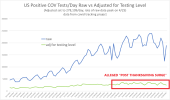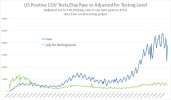And I thought that Japan was doing so much better than America due to their cultural acceptance of mask wearing and concern for the good of the group over that of individuals. Why would cases be rising there after they did such a good job of flattening the curve earlier in the year?
Personal opinion based on what I've seen in Japan... people are getting tired of the constant mask wearing, I think really for the first time. Where I used to see probably less than 1% of the population without masks and they were mostly old men I assumed had breathing problems, I now see probably about 10-15% including some younger ones. The Americans on the base I think are the worst at it and you have many who try to see what they can get away with, especially among the dependa crowd and unsurprisingly, cases are spiking on base(s) here too. Secondly, Japan had a heavily discounted tourism and indoor dining program called "Go To Japan," and "Go To Eats" (I think), that they basically offered to anyone inside of Japan already including the US military members. In short, the government subsidized 35% (?) of your hotel + train fares, and when you arrived at the hotel, if I recall correctly, they gave an additional 30% of the value of your stay in these coupons that could be redeemed at participating retailers - most often restaurants. (I took advantage of this program once and it was pretty great! Thank you Japanese tax-payer!) This spiked domestic travel within Japan and, as a result, the spread of the virus. Many Prefectural governors asked the federal government of Japan to stop it, and the gov't of Japan finally agreed to, halting the "Go To" campaigns starting on 28 Dec. Finally, I'm no Japanese Constitutional Scholar, but the Japanese government doesn't have the same authorities regarding closing businesses (or for that matter, eminent domain); what they've basically done is a variety of asking certain businesses to close, subsidizing closed hours, or reducing hours on some businesses (i.e.: hostess bars). As this pandemic has dragged on, supposedly less and less businesses are complying with the requests of the Japanese government or taking the subsidy
Separately, as it has been explained to me, Japan doesn't have quite the same problems as the U.S. in terms of lack of ICU capacity or equipment shortages, which I assume are a byproduct of ruthless American efficiency. (To be honest, I would have assumed Japan is more efficient, but I think anyone that's been here in the past decade knows that that may be true in some ways - i.e. mass transit - but the country is rapidly falling behind in terms of modern technology and their business culture of working longer not smarter and more efficiently has been difficult to change despite all the attempts to change that).
Comparing the U.S. and Japan isn't exactly apples to apples: The population complies with the Government much better. I suspect more than 15% of Americans are not wearing masks religiously, even at the peak of mask wearing; there was no domestic tourism campaign on the scale that Japan had; the American government on all levels has comparatively more power over the people than the Japanese government in the context of closing/regulating businesses, and ICU capacity isn't expected to be a problem here as I understand it.







